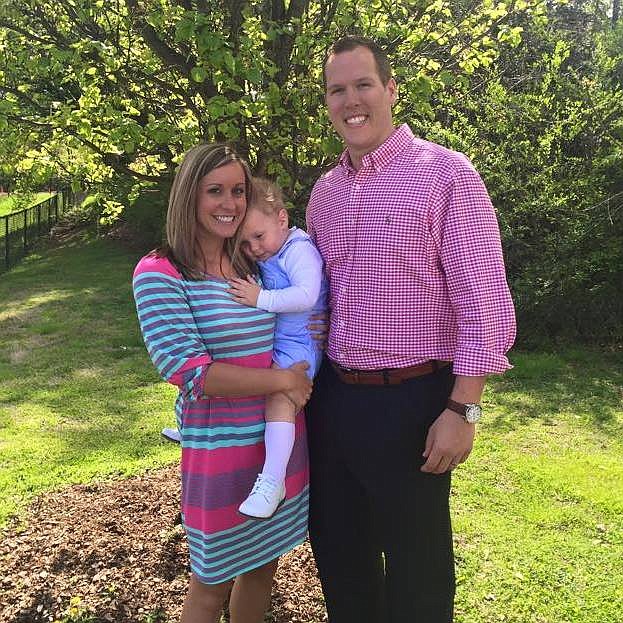Jax Smalley, 2, wasn't just a healthy newborn, he was a big ol' baby boy.
At birth, he measured 22 inches long and weighed 9 pounds, 13 ounces. His plump cheeks were rosy red, and he showed signs of inheriting his daddy's 6-foot, 3-inch frame.
For Brett and Lauren Smalley, of Chattanooga, Jax was their firstborn.
Almost immediately after bringing the baby home from the hospital, Jax turned fussy and suffered from endless bouts of what appeared to be colic. He sometimes cried 16 hours a day and had nonstop diarrhea.
"When we got him home, he almost never slept and he screamed all the time," remembers Lauren, an elementary school teacher.
A smartphone app that mimics the sound of a vacuum cleaner was the only thing that seemed to soothe the baby, and it only worked for short stretches. Meanwhile, Jax continued to lose weight and got tagged with the dreaded infant diagnosis "failure to thrive." Soon, his weight dropped to the 20th percentile, dangerously low for a baby of his length.
Understandably worried, the Smalleys began a desperate odyssey for help. They visited a series of doctors and specialists who tried, unsuccessfully, to diagnose Jax's problem.
"We went through six pediatricians and several gastroenterologists," recalls Brett, an insurance company agent.
After giving up on breast-feeding, Lauren tried a variety of formulas and supplements to help little Jax, with most designed to combat what doctors believed was a protein deficiency.
The gravity of the situation snapped into focus when one doctor suggested Jax, who was still losing weight by the day, should start getting his nourishment through a feeding tube.
"That's when we knew we were going to Vanderbilt [Children's Hospital] in Nashville," Brett said.
At Vanderbilt, the Smalleys saw children's gastroenterologist Dedrick Moulton, who quickly diagnosed the problem as a rare enzyme deficiency that made Jax intolerant of carbohydrates. The diseased, called Congenital Sucrase-Isomaltase Deficiency (or CSID), is said to affect about one in 2,000 babies.
Fortunately for children such as Jax, a medication called Sucraid can be added to their diet to correct the enzyme deficiency and allow them to absorb nutrients. Taking Sucraid, Jax immediately began to tolerate a special carb-free baby formula and gain weight.
"He doubled his weight in less than 12 months," his father remembers.
Now, almost 2 1/2 years old, Jax can eat a variety of foods and has even begun to ingest small amounts of carbs in the form of french fries and mashed potatoes. In a major milestone, he ate a small piece of his birthday cake when he turned 2 years old.
He takes Sucraid within 30 minutes of his meals to ward off digestive problems. All would be well except the supply of Sucraid in the pharmaceutical pipeline has almost disappeared.
The FDA recently stopped the makers of Sucraid, QOL Medical, from distributing the drug because of red tape involving a new plant where Sucraid is being manufactured. QOL Medical says it is awaiting regulatory approval to distribute Sucraid it has already made and packaged.
"We recognize that this process has been extremely stressful for our patients and caregivers," the company wrote in an open letter on its website.
While the situation is not life-threatening for Jax, the lack of Sucraid limits the foods he can eat and heightens his chances of having more unpleasant digestive problems.
But for infants with CSID, the situation is more serious. The Smalleys have become part of a small army of parents trying to raise awareness about CSID and press the FDA, through a petition, to expedite the release of Sucraid from the new plant. (To learn more, visit change.org and search "Sucraid.")
In the meantime, Lauren Smalley is pregnant with the couple's second child, a daughter due in September. There is a 25 percent chance their newborn will have CSID, too.
The Smalleys' situation will become much more dire if Sucraid is not available by then.
In the meantime, they hope more parents learn about CSID and gain the help their sick children so desperately need.
To suggest a human interest story contact Mark Kennedy at mkennedy@timesfreepress.com or 423-757-6645. Follow him on Twitter @TFPCOLUMNIST. Subscribe to his Facebook updates at www.facebook.com/mkennedycolumnist.

